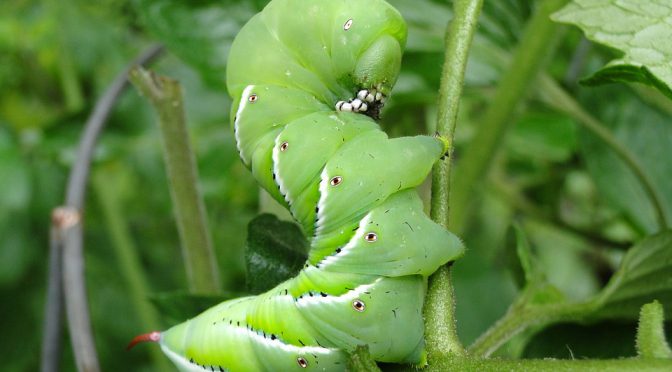Especially for new gardeners, seeing your veggies getting munched by pests can really dampen your gardening enthusiasm. There are a few ways you can solve your pest problem without resorting to chemicals.
Control
Handpicking
If you have a small garden one of the best things you can do is handpick pests. Small insects like Potato beetles are easy to squash with your fingers. For larger insects like tomato hornworms you may want to carry a bucket of soapy water to drop them into.
Note leave any hornworms with white eggs on their back. These are eggs of parasitic wasps that will help control the problem.
Ducks
Ducks and other small livestock can be helpful in ridding your garden from certain pests. Ducks are great at eating slugs! Of course, they’re a serious commitment and can also harm your garden by eating and trampling plants.
Organic Pesticides
These include products like neem oil and diatomaceous earth as well as homemade options. A popular mixture is one quart of water with 4-5 drops of dish soap and a few garlic cloves. After soaking for a few hours the garlic can be strained out and the mixture sprayed onto the plant’s leaves to kill and deter pests.
With any pesticide it’s important to keep in mind you may also be harming beneficial insects.
Prevention
While it may be too late for this season prevention is always the best option.
Plant a Trap Crop
If you notice that one particular variety of brassica is particularly infested with cabbage worms you can use this to your advantage. Use these varieties to draw pests away from others. Some folks choose to burn a trap crop that becomes heavily infested. This can help prevent pests from reproducing and being a problem the following season.
Plant a Late (or Early) Crop
If you struggled with Mexican Bean Beetles at the beginning of the summer you may have better luck with a fall crop. Experimenting with when you plant and learning about pest’s life cycles can help you work around their peak times. Keeping a garden journal can be really helpful with this!
Use Row Cover
Row cover can be used for more than just frost protection. Lightweight row cover is perfect for keeping out some pests as long as it’s set up over plants early. We sometimes use row cover or tulle to protect brassicas from cabbage moths.
Practice Crop Rotation
Avoid planting the same type of crop (ie. brassicas) in the same place more than one year. Many pests over winter in the soil and will be ready to attract plants again the following year. Check out our post, Planning Crop Rotation by Plant Family.
Attract Beneficial Birds/Insects
Some birds and insects are the natural predators to common garden pests. Making your property a haven for these creatures can help prevent pests from getting out of hand.
Keep Plant’s Healthy
Weak plants are more likely to attract pests. Keep your plants healthy by weeding, watering, and building healthy soil.

